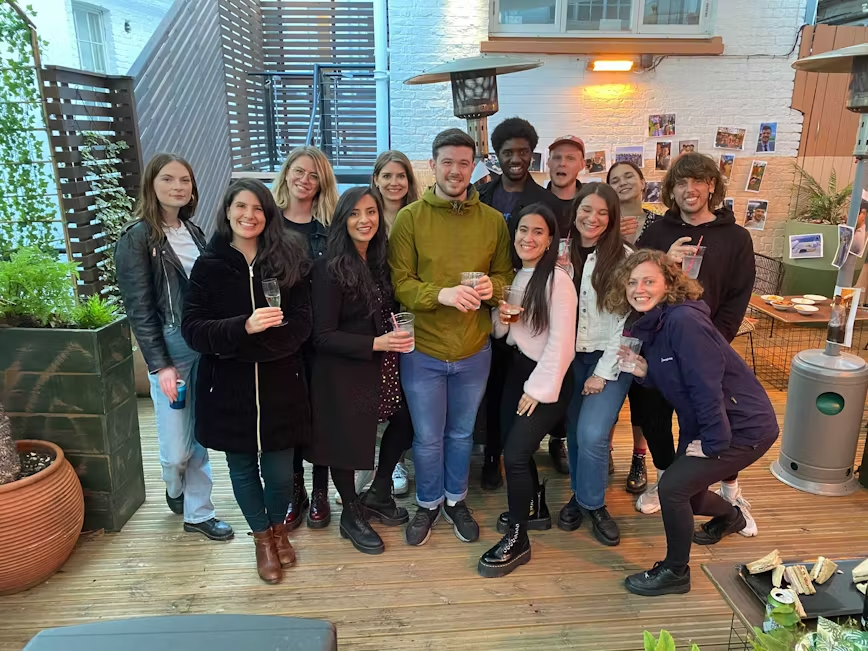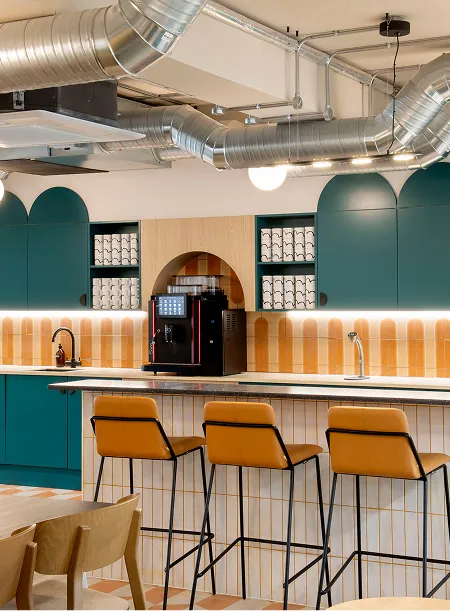Do we actually live our company values?

Peter Thiel, co-creator of Paypal, famously once said to the founders of Airbnb before investing in them: “Don’t f*ck up the culture”.
A few years into our journey we thought we’d find out if we had ‘f*cked up’ our values.
Like many startups, we at Runway East took Peter Thiel’s famous quote seriously. In early 2016 we worked with culture expert Brett Putter, founder of CultureGene, to define our values.
We developed our company CODE to live by:
Community Obsessed
Open
Damn (we give a)
Entrepreneurial
We made a nice deck showing all of them. It felt good. But now, two years, three building launches and 1000 startup members to support later, those exercises seem a long way away.
Had we just made a nice looking company culture deck?
We decided to call Brett, who helped us define our values in the first place and has been an invaluable advisor to us since day one.

An expert in company culture with 16 year’s executive search experience helping high-growth companies scale their teams as Managing Partner of an executive search boutique, Brett has interviewed over 5,000 senior executives during his career. Over the past 18 months he has interviewed the who’s who of London’s most promising startups, including Thread, CharlieHR, Hubble and Busuu, to understand how they utilise their culture as they build and scale their companies – the perfect person to tell us if we were succeeding or failing at living our values.
SO….HAVE WE LIVED OUR VALUES?
We caught up with Brett to see how we’ve lived up to the values he’d helped us define. Brett has 5 questions he asks to test if startups are living up to their values. Here are the results of our test.
1: HOW HAVE YOUR VALUES BEEN APPLIED IN A CRISIS SITUATION?
Why this matters:
A crisis is when your company’s true self shines through. If your values aren’t embedded in your response to crisis you need to work harder to ensure they are. In Brett’s own words:
“How you react to crisis reveals important underlying values, motivations and behaviours to the team.”
How we think we do on this:
Our biggest crisis: when our roof literally fell in (see Business Insider 2016), and we stayed up all night finding temporary space for all our members, and updating them on the situation as it developed. That week we even delivered cake to them on Wednesday, just as we always did (and still do) – ticking multiple boxes of community obsessed, give a damn, openness and entrepreneurial.

We’ve also learnt from our mistakes during crisis. When there was a terrorist attack in London we sent an email to our members that included some of the misinformation that was rampant on twitter at the time. Looking back on it, we were disappointed – helping spread panic in a stressful time is not very community obsessed. We revised our communications guidelines and now use the example in our onboarding for community managers. Brett’s response?
“The core values are embedded deeper into the company if the leadership demonstrate that they live the values during a crisis situation. Because a crisis is more often than not an extremely emotional experience, the team (and customers) are more likely to remember how the leaders behaved and delivered on the values.”
(Below) Values in a crisis situation: when ‘Beam-gate’ happened when we were barely 12 months old, we were open about what we knew (and what we didn’t). Our members stood by us and we went on to open a new space, twice the size, in the same year.
2: HIRING IS THE CRITICAL FIRST STEP AFTER DEFINING YOUR VALUES, HAVE YOU EMBEDDED THEM INTO YOUR RECRUITMENT PROCESSES?
Why this matters:
If you want your team to live your values as your company grows, you need to recruit people who share them. In Brett’s own words:
“Have you embedded your values into the the hiring process, are they clearly articulated on your website? In your job ads? In your job description? Have you built them into your interview questions? Have you designed your values into your onboarding
process, in your probation period and performance evaluations?”
How we think did on this:
We were pleased to see we do quite well at this – our values are available on our website and if you go to one of our job adverts, you’ll notice that our values are right there, in the job advert, front and centre. Our final interview is always a culture based interview with questions designed to test how people’s behaviour in situations in their past career reflect the values we believe to be important. We are working on the onboarding and performance evaluations pieces.
3: DO YOU PUT YOUR MONEY WHERE YOUR MOUTH IS?
Why this matters:
If you say your values are core to your company and you don’t invest money in them – you’re not being true to them. In Brett’s own words:
“How the company’s budgets are created reveals a leader’s beliefs. If, for example as CEO, you say customer service is really important to you, but you don’t invest in it or measure it, then it’s not important to you. If you don’t invest in customer service but you know you need it, you don’t value it. No matter how many times you say it”
How we think we do on this:
We've listened and steadily improved how we invest in our values and people development. We now offer all employees these amazing benefits:
🎗 Assign up to two paid workdays per year to charitable work with Matchable
💰 Matched charity fundraising of up to £500
💳 £150/year personal growth budget
Plus loads more. Check out our careers page for the full details.
4: WHAT DO YOU MEASURE AND CONTROL TO ENSURE CULTURAL CONSISTENCY?
Why this matters:
Evaluate and re-evaluate where you are with your values constantly, otherwise you’ll lose focus and your culture will spiral. In Brett’s own words:
“What I advise my clients to do is to test whether the company is living their values, and to do it on an ongoing basis, Is the team really living and breathing the values and if not, why not? It’s as simple as running a team survey every month or quarter
How we think we do on this:
We measure employee happiness through anonymous surveys, asking things like confidence in leadership, happiness with current role, management, and so on. We also measure all staff performance against our values, and reward great demonstrations of living those values with a monthly award... oops, that's the next question. Oh well.
QUESTION 5: HAVE YOU REWARDED PEOPLE FOR LIVING YOUR COMPANY VALUES?
Why this matters:
Reward behaviour that reflects your values and you’ll see the results of it. In Brett’s own words:
“There are a number of ways to change the values and behaviour of a company, you can change the reward system, what you invest in, what you measure or what you decide to control. If you change the reward structure to reward profitability your people will naturally start to adapt to the new reward structure and aim for profitability in the business. You must ensure though that you think about the impact of the change you are making. Rewarding profitability could impact customer service in a negative way because your people may start to take short cuts to reach profitability.”
How we think we do on this:
We reward a member of our team on a monthly basis with a free restaurant lunch with a friend of their choice. Nominations are made by public vote and we celebrate living our values with a good old fashioned Slack (and in person) announcement with many emojis/rounds of applause.
THE FINAL STEP: LOOKING BACK AND SEEING RESULTS
The end product should be that your company culture and values are present in every action undertaken by your company. In Brett’s own words:
“Once I’ve finished working with a client you notice their values are prevalent across the organisation, in each function, process, policy and procedure..”
How we think we do on this: We’re proud of how far we’ve progressed – but we are always looking for ways to improve ourselves. Many thanks to Brett for taking the time to talk to us – you can find dout more about his work at www.culturegene.ai.
Got Questions? We've Got Answers
We've put together some FAQs to help you settle into life at Runway East.
find your
perfect space
Discover flexible workspace solutions across London, Bristol, Bath, Brighton, and Birmingham. From private offices to enterprise suites, find a space that grows with your team and keeps them happy every day.
.webp)




.jpg)



